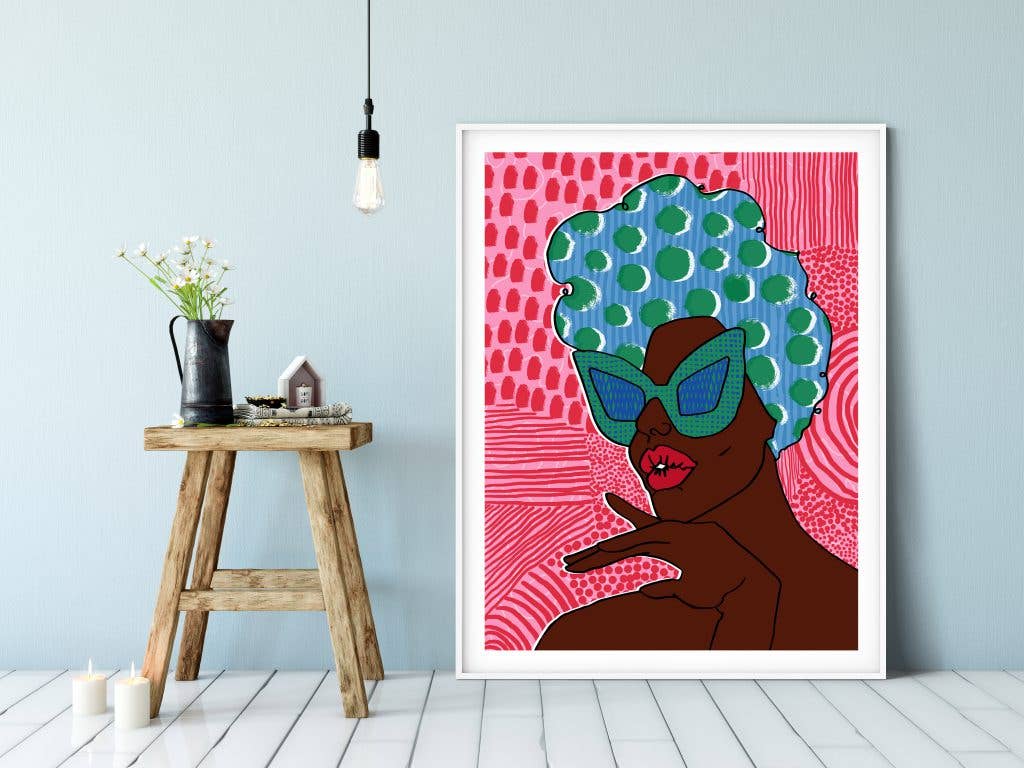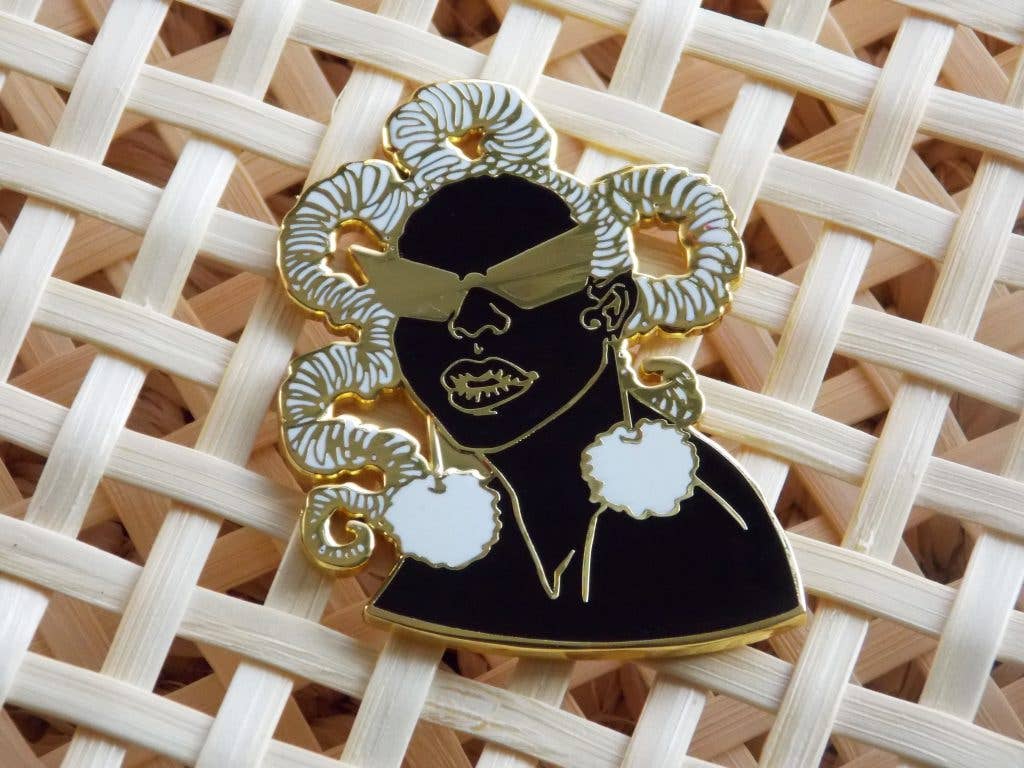
In the second episode of Brick & Order season two, we reached across the pond to speak with two U.K. brand owners—Dorcas Magbadelo of illustration brand DorcasCreates and Louise Verity of literary brand Bookishly. DorcasCreates seeks to celebrate and uplift Black women through vibrant illustrations and bold jewelry, while Bookishly sells literature-inspired products from prints and stationery to clothing and homeware. These two U.K. natives spoke to us about loving art, running small businesses, and connecting with community.
A lifelong passion for creativity
Dorcas Magbadelo always thought she’d end up in a creative career, she just didn’t know what that would look like. “I’d always done arts and crafts,” she said. “But I didn’t know what a working artist was.” She tried for a fashion degree but quickly found that it wasn’t for her. With a push from her family towards a more academic career, she completed a degree in finance. Dorcas then went on to work in education before she began drawing again and exploring art as a profession. “It hasn’t been a straight path to illustration at all,” she said.
It was conversations with her teenage students that made Dorcas consider revisiting her passion for drawing. “I was always telling them ‘follow your dreams.’ Then I realized I wasn’t even doing what I was telling these kids to do.” The final piece of inspiration came when she visited New York on vacation and went to MoMa and the Brooklyn Museum for the first time. “Just being around all that was a real catalyst for me to get back into what I love to do, which is create,” she said. Dorcas began staying behind late at work, drawing in the classroom for hours, before eventually quitting her job completely to pursue illustrating.
Similarly, Louise Verity wasn’t always sure how she would turn her lifelong love of books and reading into a career. “I was one of those kids hiding under the covers with a light, reading way past my bedtime,” she said. But it wasn’t until she was on maternity leave from her full-time job that she was able to pursue her passion. She’d begun selling her first pieces on Etsy—framed vintage pages from books with block quotes overtop—while still working a day job, creating everything by hand in the evenings and on weekends. While on maternity leave, she spent more time working on her new project. “I was able to use that time as a springboard,” she said. “I didn’t go back to my job afterward.”

A balancing act
Louise soon began selling her framed prints from a small stand at trade shows, and she loved seeing her work among the crowd of products. “I also had this massive imposter syndrome,” she said. “But I just thought, ‘I’m here, I’m doing this, and people like my product.’” More than 10 years later, the framed prints are still one of Bookishly’s best sellers. During that time, the company also began widening its scope of product, from tote bags and mugs to a subscription service that ships monthly books, coffee or tea, and stationery to customers.
Today, the challenges of running the business look a bit different than they did at those early trade shows. “For me, it’s been sometimes the imagined pressure of thinking you’ve always got to come up with something new,” Louise said. She also finds herself comparing Bookishly to other small businesses on social media. She copes by reminding herself that no matter what’s shown online, most small businesses have the same struggles. As for the pressure to always do more, Louise reminds herself not to panic. “If I just go with it, and don’t put too much pressure on myself, things then come naturally.”
Like Louise, Dorcas has felt obligated to constantly develop new products. “I think that there’s a tendency when you start out to think you have to do a bazillion different product lines,” she said. “But you can build things slowly.” Over time, Dorcas has had to learn how to strike a balance. “I want to make stuff that’s commercially viable, but I’m not going to make something just for the sake of it,” she said.
Now, she sells her bright and bold illustrations as art prints, tote bags, greeting cards, and more. Some of her most popular products are her unique pins, made of gold, black, and white material. The pins celebrate her Nigerian heritage and Black culture through hairstyle. “I have a pin that has Bantu knots, another pin has an afro, and another is a head wrap,” she said. “I feel like no matter where you’re from in the diaspora, you can look at my pin and feel some kind of connection to it.”

Developing community
Over the past decade, Bookishly has created a unique community of customers from around the world. “When you’ve got a niche, you might appeal to fewer people, but when you do appeal to somebody you really appeal to them,” Louise said. When she began selling her products wholesale on Faire and other platforms, that niche community expanded beyond just customers. For Louise, connecting with the new community of retailers carrying Bookishly products is just as exciting. “When you meet someone that gets your product and you know they’re going to be as enthusiastic about it as you were, it’s so lovely,” she said. “I just love the feeling of being the one that they chose for their shop and their shelf.”
Dorcas’s community also spans customers and fellow small business owners. She frequently connects with customers who are grateful to see her putting Black women at the forefront of her work. “It’s been really surprising, just seeing the emotional reactions people have had,” she said. “I’ll go to an event and someone will come up to me and say, ‘This illustration looks like my cousin, my sister, my girlfriend, my friend. Especially here in the UK, that wasn’t something you saw all the time.”
Through attending craft markets, Dorcas was able to form a community of fellow small business owners early on. Each year, London held events that catered specifically to Black women and Black creatives, and it was at those events that she was able to speak to and learn from fellow entrepreneurs. “They understand all your gripes,” she said. “They understand what you’ve been through, and it was nice to grow that community.”
Subscribe to Brick & Order, a podcast from Faire, to hear more stories from the small business community. Subscribe on Apple Podcasts, Google Podcasts, SimpleCast, Spotify, and Stitcher.

